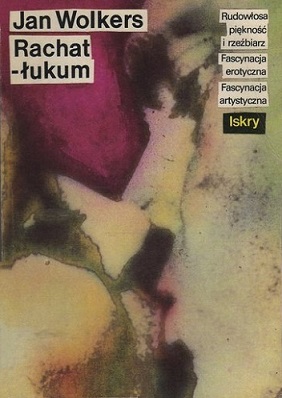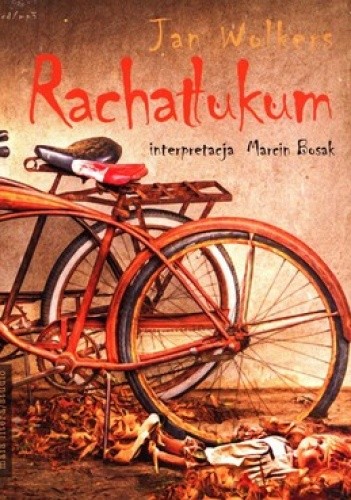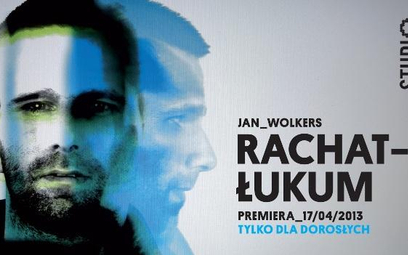The reception of Jan Wolkers' "Turkish Delight" in Poland
The contribution of Dutch-language literature to the character of Polish cultural and literary life was and still is small compared to that of English, French or German literature. In this article, I would like to take a closer look at the reception of Turks Fruit (1969), a novel by Jan Wolkers (1925-2007). It is an iconic book of the late 1960s and at the time it was a bestseller. Its 57th edition was released in the year 2019 when "Turkish Delight" (as the English translation of the novel entitled) turned fifty years old. The book has been translated into more than twenty languages and has sold over a million copies worldwide.
A forbidden novel

Cover of "Rachatłukum" by Jan Wolkers in translation of Andrzej Dąbrówka.
In 1990 (22 years after the book's publication) Wolker’s novel finally appeared in Poland. It was translated by Andrzej Dąbrówka, a renown linguist and translator of Dutch literature. Dąbrówka did an impressive amount of translations from Dutch, including both poetry and prose. Turks fruit was published by the Polish Publishing house Iskry, under the title: Rachatłukum. Iskry has been on the market since 1952. In the 20th century, it focused mainly on literature for adults as well as books for children and teenagers. Iskry's publication output includes more than 6,000 titles with a total circulation of over 170 million copies. Rachatłukum was one of the first books published after the abolition of preventive censorship. The book was put on trial under the allegation of corruption of morals and distribution of pornography. Rachatłukum was arrested and its sales were suspended until the sentence was lifted.
There was no major advertising campaign for the book in Poland (perhaps the publisher thought just simply releasing such an outrageous novel would be enough of a promotion?). Because of that, the novel did not gain much popularity. In the beginning, because the language in which it was written was often rude and verging on violation of a good taste, Rachatłukum aroused a lot of strong emotions. Toxic love, sex turned into pornography, violent language full of profanity: the justification for his shocking stylistic decisions was given by Wolkers in a Polish interview for Literatura na Świecie. The author calls a spade a spade, in his book there is no place for misunderstanding. It can stir one's extreme emotions or reactions, especially in such a conservative country like Poland. In spite of this the book garnered many positive reviews and relatively few negative ones.
Many of the reviews highly praise the author's use of language and writing skills. The direct, vulgar and blunt narration makes this story something special, according to the Polish reviewers. Simplicity and honesty, in the way the main character speaks, make it much easier to empathise with the story, which in turn becomes very real and believable. A much-discussed aspect of the novel is the behaviour of the male protagonist whose name remains unknown to the reader. The readers made note of the fact that the narrator bore a big resemblance to the author of the novel, thus a direct connection between the two was made. Reviews, in which Rachatłukum is described as a novel with an 'autobiographical character', appeared quickly. The main character received many positive feedback because, according to readers, he is very lively and true in his emotions and experiences. One of the reviewers made an interesting remark about the identity of Olga, the second main character of the novel. According to the author of the review, she is presented as a perfect woman, who is very difficult to find in today's world. There are a lot of comments that disagree with this theory. For most recipients of the book, Olga is an ordinary woman who was idealised by a man in love with her.

Cover of the "Rachatłukum" audiobook in the interpretation of Marcin Bosak.
Many Polish reviews stated that Rachatłukum is one of the best love stories the reviewers have ever read. Many considerations about the book revolve mainly around the theme of love and everything associated with it in its magnitude: spending time together, passion and desire, communicating without words, but also saying goodbye and the feeling of loss and betrayal. Rachatłukum has been a success from the start, both with most critics and the public. It was also always a controversial book because of the explicit description of sexual scenes, but that has not prevented the book from living on.
We should not forget about the film adaptation of the book by Jan Wolkers, which had a major influence on the popularity of the novel and its reception in the Netherlands. In Poland it was a bit different. The performance of Paul Verhoeven's film in Poland was not good and unfortunately, the film did not become as popular as in its home country. Still, some people read the book after seeing the movie. This proves that the film continues to encourage viewers to read the novel it is based on. The film adaptation itself also received a lot of praise and positive reviews in Poland, too bad it didn't have a good promotion, which would make more people interested in it.
In 2013, 23 years after the book was published in Poland, the poet and publisher Michał Brzozowski became interested in it. The versatile artist from Łódź has chosen this novel for his audiobook library. The publisher offered the rendition to the actor Marcin Bosak, who accepted the role. During the recording, the actor saw the potential of Wolkers' novel and decided to adapt it into a monodrama.
Theater performance

Poster for the performance in Studio Theatre Warsaw.
On April 17, 2013, the monodrama Rachatłukum premiered at the Studio Theater in Warsaw. It was adapted by director Sebastian Chondrokostas and the lead role was played by actor Marcin Bosak. In one of the interviews, Bosak pointed out that not pornographic descriptions are a strength and a message that he wants to convey, but what really interesting is, is material. He did not want the show to be perceived as scandalous.
Yet the performance was promoted as an adaptation of the scandalous and much-discussed novel by Jan Wolkers. The author was presented here as one of the greatest writers of contemporary Dutch literature. The performance took place in a colourful disco setting, typical of a stand-up or a talk show. The actor wore a matching costume: a silver jacket, star-framed glasses and a large plastic dildo.
From one of the reviews, we can find out that during the first 10 minutes of the performance, the audience felt a sense of disgust and embarrassment, which was caused by the mass of profanity that was said, as well as by the visual effects. One of the reviewers wrote:
I thought we were dealing with another step towards the demise of Polish theatre, which should shock the viewer, even in the most simple and vulgar way
However, throughout the performance, the audience's feelings very quickly changed and negative emotions were replaced by: compassion, dedication, and a passion for the story. And this is because of Kamil Bosak. The actor received a lot of positive feedback and praise. The translator of the book Rachatłukum, Andrzej Dąbrówka, congratulated the actor on his great achievement, and wrote on his blog:
My impression as a spectator was very positive. I was amazed at how surprised by “my own” text, in the sense that something verse about the well-known, self-invented (not everything could be simply translated in that respect) made me laugh; there is a correct relationship between the moral matter and the psychological in-depth, with every now and then a reason for a moving shudder. Messrs. Bosak and Chondrokostas understand the humanistic message of Jan Wolkers very well.
Other reviewers also speak very positively about it. They describe their impressions which were very different at the beginning. In their view, the performance, which at first seemed incredibly superficial, powerfully shocking and vulgar, became more interesting, more compelling and simply better with each subsequent line that was spoken. In their opinion, the text itself was truly cinematic and the stories presented with words (and sometimes gestures) alone strongly stimulated the imagination. From the statements of critics, it can be said without hesitation that the adaptation of Rachatłukum turned out to be a success.
(Patrycja Potocka)
